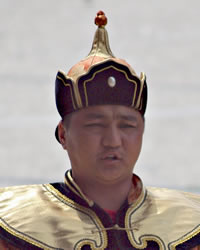Tuvan in Mongolia

Photo Source:
zoetnet - Flickr
Creative Commons
|
Send Joshua Project a map of this people group.
|
| People Name: | Tuvan |
| Country: | Mongolia |
| 10/40 Window: | Yes |
| Population: | 44,000 |
| World Population: | 342,300 |
| Primary Language: | Tuvan |
| Primary Religion: | Buddhism |
| Christian Adherents: | 1.20 % |
| Evangelicals: | 1.10 % |
| Scripture: | Complete Bible |
| Ministry Resources: | Yes |
| Jesus Film: | Yes |
| Audio Recordings: | Yes |
| People Cluster: | Ural-Siberian |
| Affinity Bloc: | Turkic Peoples |
| Progress Level: |
|
Introduction / History
Tuvans in Mongolia inhabit a harsh mountainous region in the northern part of the country, near the border of Russia. There, the summers are hot and dry, while the winters are bitterly cold. Still, this region can have as many as 300 sunny days a year, and the extremely dry air helps people to withstand the cold winters and the hot summers.
Historically some Tuvans left their home territories in Russia to avoid new Russian settlers and the imposition of Soviet policies during the USSR decades. Some Tuvan clans in Mongolia have maintained their own language, ethnic background, and traditional culture. Other Tuvan clans have been absorbed by the Mongolian culture. Their original language, Tuvin, contains many Mongolian words and uses the Cyrillic script. Most Mongolian Tuvans also speak Halh, the national language of Mongolia.
Traditionally the Tuvans were herders, living a nomadic lifestyle, and those who have not been absorbed by the Mongolian culture still follow that lifestyle. The rural clans are trying to retain their own language and heritage.
What Are Their Lives Like?
Unlike many people in Mongolia, the Tuvan people live in log cabins, not gers. Some live in towns. Most Tuvans raise livestock for a living. They also hunt and do a limited amount of farming. Oats, barley, wheat, and millet are their principal crops. Recently, farmers from northern China have introduced Tuvans to vegetable farming.
Many Tuvans still live as nomadic shepherds, migrating seasonally with their herds. The main industrial activity in the Tuvan Republic is mining, especially for asbestos, cobalt, coal, gold, and uranium. Other industries include processing food, crafting leather or wood items, and manufacturing building materials.
The Tuvan diet primarily consists of meat (mutton, beef, horse, goat, camel, reindeer, and wild game), fish, roots, cedar nuts, and dairy products. Tuvans enjoy drinking airag (fermented milk) on special occasions.
In times past, Tuvans marriages were arranged by the parents, and couples married when they reached the age of 12 or 13. Today, the minimum age for marriage is 18 and parental consent is no longer necessary. A young bride formerly lived with the husband's family, but today the couple's home is determined by their economic conditions. Divorce is common among Tuvans, and abortion is often used as a form of birth control.
Tuvans are known for a special style of singing called khomeii. It sounds like one person singing with two voices! In addition to music, they also love epic poetry. Tuvans use more than 50 different musical instruments, and traveling ensembles often perform outdoors.
What Are Their Beliefs?
The Tuvans were traditionally shamanists, believing in an unseen world of gods, demons, and spirits. Although one third are Tibetan Buddhists and one third are non-religious, today the majority still revert to many shamanistic ceremonies and practices when there is sickness or another serious need.
What Are Their Needs?
There are a number of Tuvan believers, but they need to take Christ to those who still don't know that Christ came to save sinners.
Prayer Points
Pray that Christian radio and television broadcasts will be made available to Tuvans wherever they live.
Ask the Holy Spirit to soften the hearts of Tuvans toward Christ and that they will be become receptive to Him.
Pray this will be the decade of an unstoppable movement to Christ among the Tuvan people.